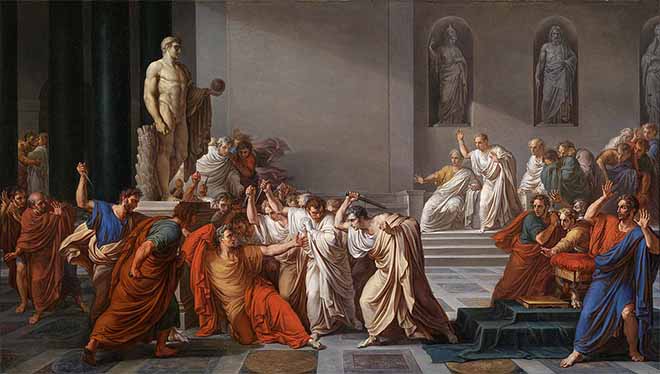Assassination of Julius Caesar
Premonitorial Signs Announced His Death ?

Julius Caesar, decree eternal dictator of Rome by the senate, is assassinated in the year 44 BC during the Ides of March at the Curia of Pompey. Plotters, which included influential members of the Roman senate like Cassius and Brutus, claimed to have wanted to prevent Julius Caesar from establishing a new monarchy in Rome in order to save the republic, but in reality would have had much darker motives for wishing the death of Caesar. Many of them would have felt a deep bitterness towards Julius Caesar because of frustrated aspirations. The assassination, far from having the effect expected, only triggered a civil war. According to historian and ancient biographer Suetonius, Julius Caesar would have received shortly before his assassination many warnings in the form of premonitions and omens but would not have listened to them.
Many premonitory warnings

Thus, a haruspex priest named Spurinna, capable of foreseeing the future in the guts of animal sacrifices, would have predicted to Julius Caesar a tragic end the day of the Ides of March. Moreover, a few days before the assassination, horses dedicated by Julius Caesar to the deity of the Rubicon, which was the place for one of his great civil conquests, exhibited strange behaviors, refusing to eat and crying in sob. A burial discovered in the city of Capua also delivered a tablet sporting inscriptions predicting the death of an heir to Ascanius, ancestor of Julius Caesar, betrayed by his allies as well as serious reprisals. Then, people said they saw a wren being slaughtered by a flock of birds the day before the assassination at the very place where Julius Caesar died, at the Curia of Pompey. During his final meal, Julius Caesar would have curiously reported to his guests that the best way to die is unexpectedly. In the night of the Ides of March, Julius Caesar's wife Calpurnia, prey to terrible premonitory nightmares, begs Julius Caesar to postpone his meeting with the senators, and he acquiesces.
Betrayed by Brutus

Julius Caesar then informs Mark Antony of his decision but is quickly rebuffed by Brutus who, noting that the plot is aborted, manages to convince the dictator to go to the Senate by invoking the nobility and bravery of it. On the way to the Curia in a Roman litter, Julius Caesar receives an urgent note from an unknown passerby who reveals the imminent attack but chose not to read it, probably distracted by something else. Ironically, Julius Caesar would also cross the path of the haruspex who had predicted his misfortune and laughed at his clairvoyant gifts. On arriving at the senate, Julius Caesar remarks that haruspices make mine of bad auspices but nevertheless goes to the Curia of Pompey where more than twenty senators awaits. Just sitting in his golden chair, a senator implores the grace of Julius Caesar who categorically refuses to bend while another stands guard outside to prevent Mark Antony from circumventing the plot. It is then that conspirators pull out swords from their togas and start thrashing the dictator, mortally wounded by one of them. Amazed at having been betrayed in this way by Brutus, Julius Caesar would have mentioned a few moments before his death the now famous words: "You too, my son".









































































































































































































































































































































